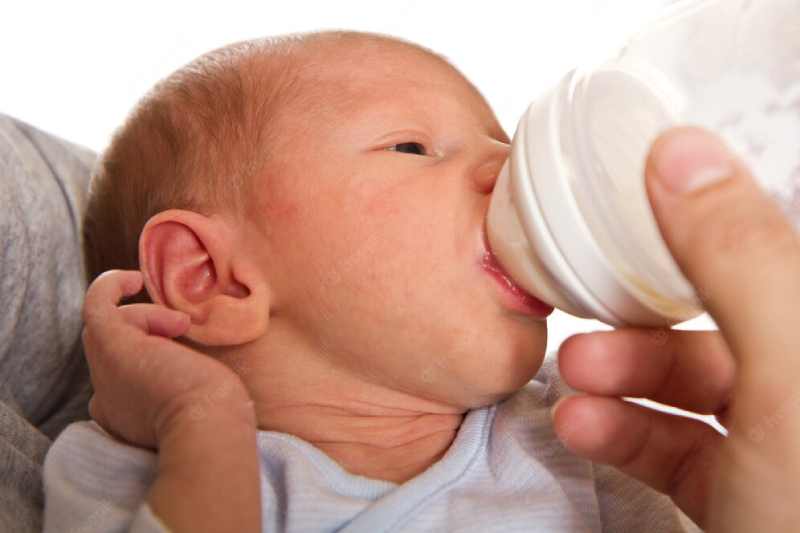Raising a baby can be exciting and full of unexpected events. Milk or formula coming out of the baby’s nose is one of the strangest experiences you may have while feeding your baby. But hello, mom! Don’t worry.
It is what “life after baby” looks likes. If your baby is between 0 and 3 months, then his behavior falls under average and normal baby behavior. As milk flows toward the nose and mouth rather than the stomach, it comes out of your baby’s nose.
Since Babies have immature digestive systems. Suppose you feed your baby too quickly or more than they usually have. In that case, your baby might have digestion problems later, resulting in regurgitation. That’s why you should be careful for the first few months.
What Does Milk Coming From The Baby’s Nose Mean?
This shows that because your baby’s body is so tiny and is still learning to suck and gulp down milk or formula, babies generally mess it up during and after breastfeeding. While it’s disgusting and causes your baby to struggle, what else can we expect from a baby?
Let’s examine some of the scenarios to determine if there are any additional causes for this condition.

Reason 1: Nasal Regurgitation
Nasal regurgitation describes when a baby spits up through the nose. The milk amount is more than what your baby can handle while feeding. Feed your baby according to his or her size.
Reason 2: Improper Digestive Tract Development
Baby’s immature digestive system, specifically the lower esophageal. This may result in milk coming out of a baby’s nose. Newborns and twins may not have a fully developed stomach valve connecting the esophagus and the stomach.
Reason 3: Distracted Feeding
Your baby may not be swallowing the milk due to distraction from environmental stimulation and may not be sucking appropriately.
Reason 4: Taking Air While Feeding
Drinking too quickly or starting to swallow results in a large amount of air intake. They don’t like it in their tiny stomachs, which can suddenly force it back out while taking liquids with them.
Reason No. 5: Involuntary Actions While Eating
When your baby coughs or sneezes because it pushes air into the mouth and nose. Your baby isn’t as conscious of involuntary bodily actions as you are, such as sneezing, coughing, or hiccupping. They cannot wait and resume feeding.
Reason 6: Baby Might Have a Cleft Lip
It might appear as a very unusual explanation, but it can be the most prevalent deformity. A baby with a cleft palate has a hole in its mouth’s roof, making it simple for milk to enter its nasal cavities.
Reason 7: Spending a Lot of Time Lying Still
Sometimes baby milk comes out, usually after lying flat for long periods. These include taking a long nap without considering a burp.
How to Respond If My Baby’s Nose Starts To Milk?

Step One: Don’t freak out mama!
Step Two: “Clean it away as you do when it appears out of the mouth,” except if the baby is having difficulty breathing.
Step Three: Hold your baby in a good posture.
Step Four: Using a nasal aspirator designed for babies, you can try to remove any milk that has gotten stuck in your baby’s nose.
Step Five: Help heal and calm your baby
Tips To Avoid Nasal Regurgitation

In-Between-Feeding Instructions
- Feed your baby on time.
- If your child drinks from a bottle, check to see that the nipple hole isn’t too big.
- Allow your baby to burp even when they are not being fed.
- When your baby is about to wheeze, sneeze, or Burp, stop feeding them.
- Adopt the appropriate breastfeeding position and posture.
- Avoid overfeeding your little one.
Post-Feeding Instructions
- Wait for your baby to Burp before doing anything.
- Maintain your baby’s upright position for a while.
- Take off their tight clothing.
- Keep your baby’s hunger in check.
- Baby should be placed on their back to sleep.
- Make use of hypoallergenic baby formula.
- Feeding schedule adjustment and in a room free of all distractions so that the baby can have a good milk time with you.
Conclusion
Feeding your baby isn’t that tricky. Sometimes, it can become a problem where you might feel vulnerable and afraid. It is only the beginning, so don’t worry if your baby has milk coming out of their nose. Consult your pediatrician if you can’t handle the situation on your own or need any additional advice.



